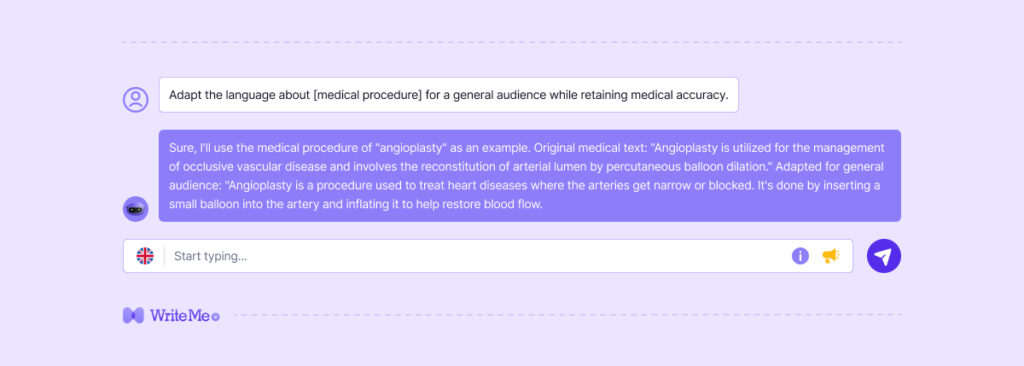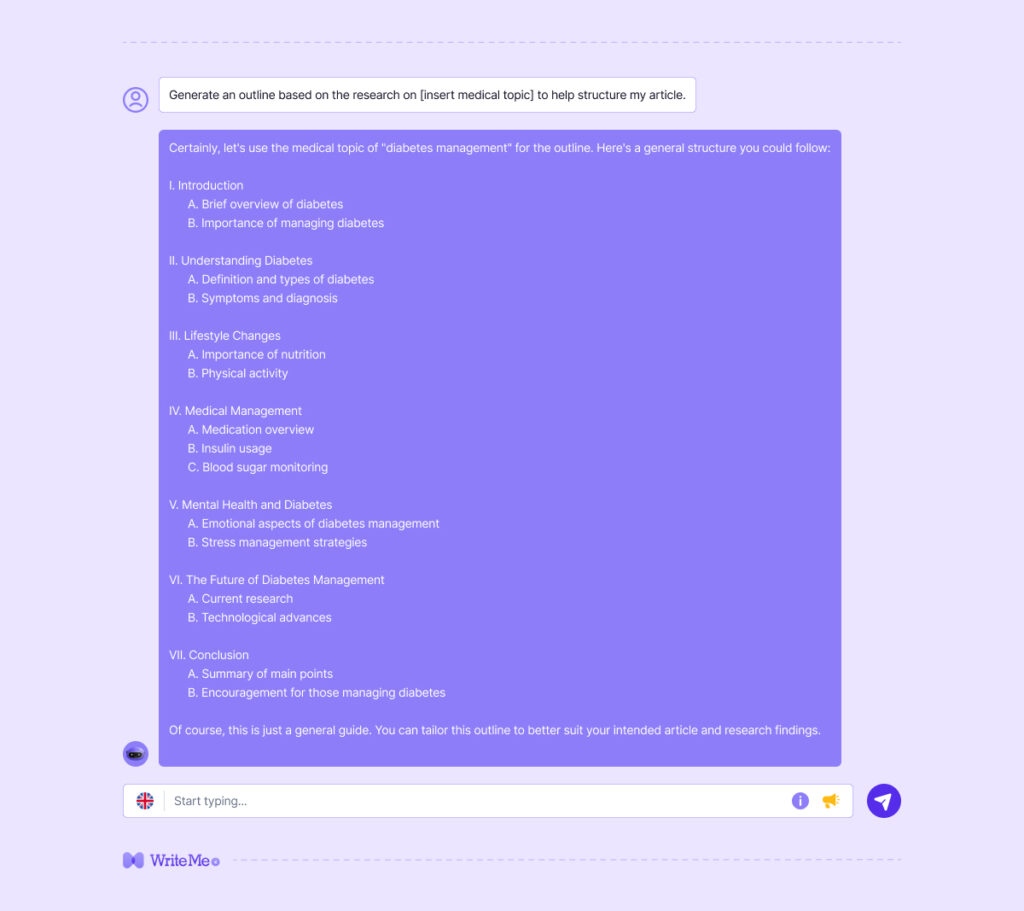- 1) Simplify Complex Terminology:
- 2) Adapt Content Tone for Different Audiences:
- 3) Format Citations According to Guidelines:
- 4) Combine Ethics with Clear Communication:
- 5) Organize Information Logically:
- 6) Enhance Understanding of Medical Concepts:
- 7) Use AI To Summarize Long Medical Studies:
- 8) Use AI to Enhance Grammar and Style:
- 9) Gain Scientific Precision and Simplicity:
- 10) Craft Approachable Patient Communications:
- 11) Maintain Objective Tone and Language:
- 12) Refine Content with AI-Powered Editing:
- 13) Ensure Consistent Terminology:
- 14) Get Contextual Vocabulary Suggestions:
- 15) Automate Citation and Reference Formatting:
-
16)
Make Content Globally Accessible through AI Translation:
- 16.1) Identify Your Objectives:
- 16.2) Know Your Audience:
- 16.3) Customize AI Suggestions:
- 16.4) Combine Human Expertise with AI:
- 16.5) Stay Updated with AI Advances:
- 16.6) Experiment with AI-Generated Outlines:
- 16.7) Proofread with AI Assistance:
- 16.8) Run Originality Checks:
- 16.9) Fact-Check and Verify Data:
- 16.10) Rework Attention-Grabbing Headlines:
- 16.11) Engage in AI-Enhanced Research:
- 16.12) Use AI for Multilingual Content Carefully:
- 16.13) Stay Ethical and Responsible:
- 17) Non-Medical Writers Come Across Several Medical Writing Challenges
- 18) The Solution: Use AI in Medical Writing
Are you struggling to make sense of all those fancy medical words? Medical writing can be like cracking a secret code that only doctors seem to understand. But guess what? You’re not alone. If you’re not a medical expert, these challenges can feel like trying to navigate a maze blindfolded. Solution? Use AI in medical writing.
Imagine trying to explain complex medical stuff in a way that doesn’t make people’s heads spin. It’s like trying to speak a foreign language without ever learning the words. Plus, getting things wrong? That’s like walking on thin ice.
Use Our AI Medical Writing Guide – your trusty sidekick in AI powered medical writing. From tackling those research papers that feel like an uphill battle to making doctor and layman friendly, you will find some great tips on how to Use AI in medical writing.
Let’s see some helpful tips on how to use AI in medical writing:
Simplify Complex Terminology:
Ever read something and felt like you stumbled into a maze of medical words? AI tools can help. They take those tongue-twisting terms and swap them for plain language, so you’re not left scratching your head. You get the info without needing a medical dictionary.
Reusable AI Medical Writing Prompt:
“Provide simpler alternatives for ‘myocardial infarction’ in patient-focused content, maintaining accuracy.”
Output:
Sure, simpler alternatives for “myocardial infarction” can be “heart attack” or “blockage in the heart”. Both of these terms are accurate and easier for a patient to understand.

Adapt Content Tone for Different Audiences:
Imagine writing for doctors and your neighbor. That’s a balancing act, but AI can help. It tweaks your words to fit the crowd you’re talking to, making sure your message resonates whether you’re addressing pros or just regular folks.
Reusable AI Medical Writing Prompt:
“Adapt the language about [medical procedure] for a general audience while retaining medical accuracy.”

Format Citations According to Guidelines:
Citations – the bane of every writer’s existence. But guess what? AI can do the heavy lifting. Tell it the style you need, and bam! Your references are neatly organized, and you’re spared the headache.
Reusable AI Medical Writing Prompt:
“Format the references in this content according to the AMA style guidelines [insert content].”
Combine Ethics with Clear Communication:
Talking about medical stuff isn’t just about facts; it’s about feelings too. AI checks your content for both – making sure your words are sensitive and accurate. It’s like having an empathy filter for your writing.
Reusable AI Medical Writing Prompt:
“Review this content discussing [treatment/condition] for empathetic language and medical accuracy. [insert content]”
Organize Information Logically:
Ever read something that jumps all over the place? AI helps you avoid that. It lays out your ideas in a logical sequence, so your readers don’t feel like they’re on a roller coaster of information.
Reusable AI Medical Writing Prompt:
“Generate an outline based on the research on [insert medical topic] to help structure my article.”

Enhance Understanding of Medical Concepts:
You know those terms that sound like gibberish? AI breaks them down for you. It explains stuff in everyday language, so you’re not lost in a sea of medical mumbo-jumbo.
Reusable AI Medical Writing Prompt:
“Explain the term ‘diabetes mellitus’ in simple language suitable for a general audience.”
Use AI To Summarize Long Medical Studies:
Imagine you’re on a mission to stay hip with the latest medical marvels. AI writing tools slide in like your trusty research partner. They dive into those hefty research papers, sieve out the juicy nuggets – the big discoveries, the methods that matter, and the outcomes that count. So, you’re up to date without feeling like you’re drowning in paper seas.
Expert Tip: Use AI to summarize research papers and quickly identify relevant information. Combine summaries from different tools to create a comprehensive overview.
Reusable AI Medical Writing Prompt:
“Summarize this research paper on [topic] to highlight the key findings, methods, and results. [insert research paper content]”
Use AI to Enhance Grammar and Style:
Think about it: you’re crafting a case study that’s got to be both brainy and breezy. That’s where AI tools step in, your language wizards. They catch those tangled sentences and serve up smoother options. Your medical expertise flows smoothly, even for folks who aren’t experts.
Expert Tip: Utilize AI grammar tools, but also customize their suggestions to match medical writing conventions. Regularly review and adapt these suggestions to create a consistent medical writing style.
Reusable AI Medical Writing Prompt:
“Review [medical case study] for complex sentence structures and suggest simplifications while maintaining medical accuracy. [insert case study]”
Gain Scientific Precision and Simplicity:
Picture this: you’re explaining a medical concept, and you want it to make sense to everyone. AI comes to the rescue, making sure you don’t lose the juicy details while keeping things simple. It’s like having a science translator that keeps it real.
Reusable AI Medical Writing Prompt:
Review my explanation of [specific medical concept] and suggest ways to simplify it without losing important details. [insert your explanation]”
Craft Approachable Patient Communications:
Explaining medical things to patients isn’t easy. But AI makes it a breeze. It helps you turn complex info into friendly chats, so patients can make informed decisions without feeling lost.
Reusable AI Medical Writing Prompt:
“Offer patient-friendly explanations of [medical procedure/condition] for a brochure targeting non-medical readers.”
Maintain Objective Tone and Language:
Explaining medical things to patients isn’t easy. But AI makes it a breeze. It helps you turn complex info into friendly chats, so patients can make informed decisions without feeling lost.
Reusable AI Medical Writing Prompt:
“Review [content] to ensure it remains objective, with no personal opinions or biases. “
Refine Content with AI-Powered Editing:
Ever wished for a writing assistant that polishes your work? AI’s got you. It fine-tunes your writing, making it shine like a pro did the editing.
Reusable AI Medical Writing Prompt:
“Edit [ article] according to medical writing best practices to enhance clarity and accuracy [insert article].”
Ensure Consistent Terminology:
Ever been lost in a maze of words? AI tools become your terminology detectives. They nab those sneaky word switches, making sure your team’s masterpiece speaks the same medical language. It’s like teamwork on the same musical note – smooth, harmonious, and crystal clear.
Expert Tip: Create a glossary of standard medical terms and phrases. Use AI tools to cross-reference your writing against this glossary, ensuring consistent usage throughout.
Reusable AI Medical Writing Prompt:
“Check this manuscript for variations in medical terminology and suggest corrections to maintain uniform language. [insert manuscript]”
Get Contextual Vocabulary Suggestions:
Now, let’s talk about breaking things down for everyday folks. AI writing tools become your translation buddies. They swap complex medical words for simpler ones, turning your patient education materials into a friendly chat. No more jargon confusion – just clear understanding.
Expert Tip: Use AI tools to recognize medical jargon and suggest layman-friendly alternatives. Test these suggestions with non-expert readers to ensure clarity without compromising accuracy.
Reusable AI Medical Writing Prompt:
“Suggest simpler alternatives for [complex medical terms] in [patient education document] while retaining the accuracy of information.”
Automate Citation and Reference Formatting:
You’re diving into the research jungle, but then come the citation monsters. But wait, AI tools to the rescue! They swoop in as your citation superheroes. They gather your sources, weave them into the right format, and voilà – your references are a neat and tidy bunch, while you focus on the meaty stuff.
Expert Tip: Regularly update your AI tool’s reference styles based on journal guidelines. Manually check a sample of generated citations to ensure accuracy.
Reusable AI Medical Writing Prompt:
“Generate citations and compile a bibliography in AMA format for the references in [research paper].”
Make Content Globally Accessible through AI Translation:
You’re sharing medical wisdom, but languages stand in the way. Enter AI-powered translation tools, your linguistic pals. They take your work and shape it into different languages, so your insights dance across borders and break through language barriers. It’s like having a global megaphone for your expertise.
Expert Tip: While AI tools can aid in translation, engage medical professionals fluent in the target language to review and refine the translated content for accuracy.
Reusable AI Medical Writing Prompt:
“Translate [patient brochure content] from [English] to [target language], ensuring that medical terminology is accurately conveyed
Additional Tips for Using AI in Medical Writing
Identify Your Objectives:
Before diving into AI tools, clarify your writing goals. Are you creating patient education content, research summaries, or opinion pieces? Different tools may be more suitable for each purpose, so align your tool choice with your content type.
Know Your Audience:
Understand who you’re writing for. AI tools can help simplify complex terms, but for medical professionals, the jargon might be necessary. For patient-facing content, AI can aid in keeping it approachable and understandable.
Customize AI Suggestions:
AI tools provide suggestions, but don’t treat them as gospel. Tailor these suggestions to your unique writing style. For instance, if you often use specific medical acronyms, train the AI to recognize and appropriately incorporate them.
Combine Human Expertise with AI:
While AI tools enhance efficiency, remember that they lack human intuition. Always review and refine AI-generated content to ensure it aligns with medical accuracy and context. Your expertise is irreplaceable.
Stay Updated with AI Advances:
AI writing tools continuously improve. Stay informed about updates and new tools specifically designed for medical writing. Regularly explore emerging options that might better suit your evolving needs.
Experiment with AI-Generated Outlines:
Consider letting AI generate an outline for your medical blog post. It can analyze your research and suggest a structure that ensures you cover all crucial aspects of the topic. This can be a time-saving starting point for your writing.
Proofread with AI Assistance:
While you’re a medical expert, AI tools are grammar helpers. Use them to meticulously proofread your articles, catching those tricky typos and grammatical errors that might slip through your medical-focused review.
Run Originality Checks:
Imagine you’re piecing together a massive medical puzzle from all over. AI-powered originality checks? They’re your puzzle guardians. They scan your work against the whole world’s knowledge, making sure your brilliance shines, without any accidental copy-paste hiccups.
Expert Tip: Before submission, run your manuscript through multiple plagiarism detection tools. Cross-reference results to ensure that your work is entirely original and properly attributed.
Fact-Check and Verify Data:
AI tools can assist in cross-referencing data within your articles. However, verify critical medical information from reputable sources independently to ensure your content is reliable and trustworthy.
Rework Attention-Grabbing Headlines:
Experiment with AI-generated headlines to pique reader interest. However, don’t solely rely on them; leverage your medical insights to ensure that the headline accurately reflects the content’s value.
Engage in AI-Enhanced Research:
Use AI-powered research tools to scour medical databases for relevant studies. These tools can save you time by sifting through vast amounts of literature and delivering the most pertinent information.
Use AI for Multilingual Content Carefully:
If you’re catering to an international audience, leverage AI translation tools to offer your content in multiple languages. However, ensure translations are reviewed by medical experts to preserve accuracy.
Stay Ethical and Responsible:
When using AI tools to generate content, give proper attribution for AI-generated portions, especially in medical writing where you are using AI.
Non-Medical Writers Come Across Several Medical Writing Challenges
- Navigating Complex Medical Terminology.
- Conveying Scientific Concepts in Simple Language.
- Summarizing Extensive Research Papers Succinctly.
- Adapting Tone for Different Audience Levels.
- Formatting Citations According to Guidelines.
- Balancing Ethical Considerations and Clarity.
- Structuring Information Logically and Coherently.
- Explaining Medical Concepts to Non-Experts.
- Staying Current with Rapid Medical Advancements.
- Crafting Patient-Friendly Communications.
- Maintaining Objective and Unbiased Content.
- Ensuring Accurate and Well-Edited Writing.
The Solution: Use AI in Medical Writing
Simplify the overwhelming task of medical writing and use AI writing tools to write medical content like a pro. AI in Medical writing unlocks new avenues of scientific precision and tone accuracy for your audience, so you can establish your authority in the medical niche.



